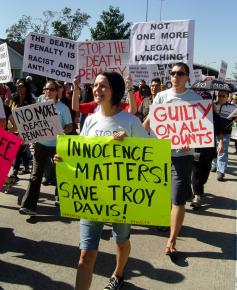Abolitionists discuss their fight
of the Campaign to End the Death Penalty describes the organization's national convention.
CHICAGO--About 75 people attended the national convention of the Campaign to End the Death Penalty (CEDP) convention November 8 and 9 to discuss next steps in the struggle to abolish the death penalty.
The highlight of the convention was a Live from Death Row forum attended by more than 120 people on Saturday evening--featuring a live discussion via telephone with Mumia Abu-Jamal from his Pennsylvania prison cell. Mumia answered questions about his own case as well as the potential for organizing a fighting movement.
After the audience greeted his call with a deafening chant of "They say death row, we say hell no!" Mumia's response was: "I'm overwhelmed." His advice for activists fighting the racist death penalty was short and simple: "Organize, organize, organize.
Other speakers at the Live from Death Row meeting were also riveting.
Darrell Cannon spoke of the 24 years he spent behind bars for a crime he did not commit after enduring torture at the hands of the Chicago police. Martina Correia read a statement from her brother, Troy Davis, on Georgia's death row for a crime he did not commit. And Sandra Reed spoke of the fight for her son Rodney on Texas' death row.

Exonerated former death row prisoner Darby Tillis closed out the program, with a powerful account of how he was "kidnapped, used and abused" by the Illinois criminal justice system and spent "nine years, one month and 17 days" on death row for a crime he did not commit. He closed with a moving rendition of his song "Bags."
During the rest of the weekend, speakers expressed excitement about the new mood in the country with the end of the Bush era and the election of the first African American president. One of the recurring themes was about how to tap into opportunities for activism in this changed climate.
Participants also discussed other questions that abolitionists have been grappling with. For example, some abolitionists have advocated calling for a sentence of life without parole as an alternative to the death penalty and argued that this strategy was a main reason that abolition in New Jersey succeeded. But in contrast, the CEDP convention passed a resolution stating that we do not advocate life without parole as a just alternative to the death penalty.
A subsequent workshop called "Lethal Incarceration" took the discussion further, as participants discussed what it would take to win real alternatives to incarceration.
Delegates also voted to organize a speaking tour to highlight the voices of prisoners, family members and the exonerated. And they voted to commemorate the December 13 anniversary of the execution of Stan Tookie Williams. Chapters are planning events in solidarity with December 13 public hearings on the death penalty being organized in California, Tookie's home state.
On the second day of the convention, a series of workshops offered practical organizing strategies, such as working with lawyers, writing to prisoners and getting good media coverage.
In addition to the working sessions, there were also plenty of moving testimonials from death row prisoners, the exonerated and prisoners' family members. Martina Correia spoke about the fight for her brother, Troy Davis, who has faced three execution dates and received three stays, thanks to the efforts of Martina herself and tens of thousands of supporters around the world.


